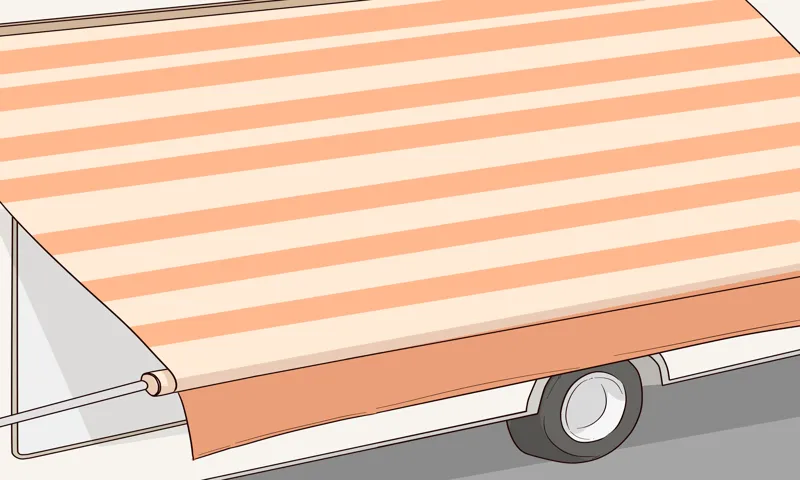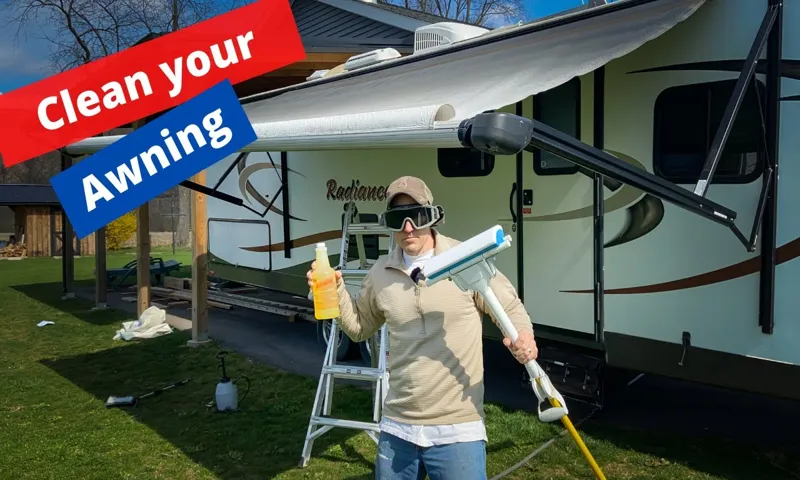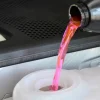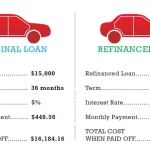Have you ever looked up at your RV awning and wondered why it’s so important to keep it clean? Well, let me tell you, cleaning your RV awning is not just about appearances – it serves a much greater purpose. Think of your awning as the protective shield of your outdoor living space, shielding you from the harsh elements and providing a cozy haven for relaxation. Just like any other part of your RV, your awning requires regular cleaning and maintenance to keep it in tip-top shape.
Imagine if you never washed your car and let dirt, grime, and debris build up on the surface. Not only would it look unsightly, but it could also damage the paint and lead to costly repairs. The same principle applies to your RV awning.
Over time, dirt, dust, pollen, bird droppings, and other environmental pollutants can accumulate on the fabric, making it appear dull and worn. Not only does this detract from the overall aesthetic appeal of your RV, but it can also weaken the fabric and cause it to deteriorate faster. But it’s not just about keeping your RV looking good, there are practical reasons for cleaning your awning as well.
One of the main benefits of a clean awning is that it helps prevent mold and mildew growth. These pesky fungi thrive in damp environments, and if left unchecked, they can quickly take over your awning, leaving behind unsightly stains and a musty odor. Regular cleaning, along with proper air circulation, can help prevent mold and mildew from taking hold and causing damage to your awning.
Another important reason to keep your RV awning clean is to ensure its longevity. In addition to environmental pollutants, your awning is exposed to the harsh rays of the sun, which can cause the fabric to fade and weaken over time. By regularly cleaning and treating your awning, you can help prolong its lifespan and save yourself the expense of having to replace it prematurely.
So, whether you’re a full-time RVer or just enjoy using your RV for weekend getaways, taking the time to clean and maintain your awning is an essential part of RV ownership. Not only will it improve the overall appearance of your RV, but it will also protect your investment and ensure that you can continue to enjoy the great outdoors in style and comfort. So, grab your cleaning supplies and get ready to give your awning the TLC it deserves!
Table of Contents
Materials and Tools Needed
When it comes to cleaning your RV awning, there are a few materials and tools that you will need to get the job done properly. First and foremost, you will need a mild detergent or RV awning cleaner. This is important because using harsh chemicals can damage the fabric of the awning.
Additionally, you will need a soft-bristle brush or a clean sponge to scrub away any dirt or stains. It’s also a good idea to have a hose or a bucket of water nearby to rinse off the cleaner and any dirt that you remove. Finally, you may want to have a ladder or a step stool on hand to reach the top of the awning if needed.
With these materials and tools, you will be well-equipped to clean your RV awning and keep it looking its best.
1. Cleaning Solution
cleaning solution, materials and tools needed. When it comes to keeping our homes clean and tidy, having the right cleaning solution is essential. Whether you’re tackling dirty countertops or grimy windows, having a reliable solution on hand can make all the difference.
So, what materials and tools do you need to create an effective cleaning solution? Well, it’s actually quite simple. You’ll need a few basic ingredients that you probably already have in your kitchen. These include water, vinegar, baking soda, and a few drops of dish soap.
With just these common household items, you can create a powerful cleaning solution that will tackle dirt and grime with ease. And the best part? You won’t have to spend a fortune on expensive store-bought cleaners.

2. Soft-bristle Brush
One essential tool you’ll need for taking care of your teeth and gums is a soft-bristle brush. This type of brush is perfect for gently cleaning your teeth without causing any damage to your enamel or gums. The bristles on a soft-bristle brush are made of fine, flexible material that can easily reach all the nooks and crannies in your mouth.
They are designed to effectively remove plaque and food particles from your teeth and gums, helping to prevent cavities and gum disease. Plus, using a soft-bristle brush can also be beneficial if you have sensitive teeth or gums, as it won’t cause any discomfort or irritation. So, make sure to invest in a soft-bristle brush and give your teeth the care they deserve!
3. Water Hose
water hose, materials and tools needed When it comes to water hoses, having the right materials and tools is essential for a smooth and hassle-free experience. First and foremost, you’ll need a high-quality water hose. Look for one that is durable, flexible, and has a good length that suits your needs.
Additionally, make sure the hose is made from materials that are resistant to kinking and UV damage. To ensure a secure connection between the hose and the water source, you’ll need a hose connector. There are various types available, such as quick-connect fittings or threaded connectors.
Choose one that is compatible with your water source and fits securely onto your hose. Another important tool is a hose reel or holder. This will help you keep your hose neatly coiled up when it’s not in use, preventing tangles and prolonging its lifespan.
There are different options available, from wall-mounted reels to freestanding ones. Consider the size of your yard or garden and the length of your hose when choosing the right reel or holder for you. Lastly, don’t forget about nozzle attachments.
These will allow you to control the water flow and choose the spray pattern that suits your needs. Whether you need a gentle mist for delicate plants or a powerful jet for cleaning tasks, having a variety of nozzle attachments can make your watering tasks much easier. In conclusion, when it comes to water hoses, having the right materials and tools is crucial.
Invest in a high-quality hose that is durable and flexible, and consider its length and resistance to kinking and UV damage. Ensure a secure connection with a hose connector and keep your hose tidy with a hose reel or holder. Lastly, make your watering tasks easier with a variety of nozzle attachments.
Step-by-Step Guide to Cleaning Your RV Awning
Are you ready to tackle the task of cleaning your RV awning? Don’t worry, it’s not as daunting as it may seem. With a few simple steps, you can have your awning looking as good as new in no time. First, start by giving the awning a good rinse with plain water to remove any loose dirt or debris.
Next, mix a solution of mild soap and water and use a soft brush or sponge to gently scrub the awning. Be sure to pay extra attention to any stubborn stains or spots. Rinse the awning thoroughly to remove all soap residue.
Once the awning is clean, allow it to dry completely before retracting it. This will help prevent mold and mildew from forming. It’s also a good idea to apply a waterproofing spray to help protect the awning from future stains and damage.
And there you have it – a clean and beautiful RV awning ready for your next adventure.
1. Prepare your workspace
Cleaning an RV awning may seem like a daunting task, but with a step-by-step guide, it can be a breeze. The first step in the process is to prepare your workspace. This means finding a suitable area where you can easily access the awning and have enough space to move around.
Make sure to clear any clutter or obstacles that may hinder your cleaning process. It’s also a good idea to lay down a tarp or drop cloth to protect the ground from any dirt or debris that may fall during the cleaning process. By preparing your workspace beforehand, you can ensure a smooth and efficient cleaning process for your RV awning.
2. Extend the awning
RV awnings are a great addition to any recreational vehicle, providing shade and protection from the elements. However, over time, they can accumulate dirt, debris, and even mold. Cleaning your RV awning is an important maintenance task that will not only keep it looking nice but also extend its lifespan.
So, where do you start? The first step is to extend the awning fully. This will give you better access to all parts of the fabric and make the cleaning process easier. It’s like unfolding a giant umbrella to get it ready for a sunny day at the beach.
By extending the awning fully, you’ll be able to see any spots or stains that need extra attention and ensure that you clean every inch of the fabric.
3. Remove loose debris
“RV awnings are a great addition to any recreational vehicle, providing shade and protection from the elements. However, they can accumulate dirt, dust, and debris over time, making them look dirty and reducing their effectiveness. To clean your RV awning and keep it looking its best, it’s important to follow a step-by-step guide.
One of the first and most important steps in cleaning your RV awning is to remove any loose debris. This includes leaves, twigs, and any other items that may have gotten stuck or fallen onto the awning. Removing this debris will prevent it from getting trapped and potentially causing damage to the fabric or mechanism of the awning.
You can use a broom, a soft brush, or even your hands to brush or sweep away the loose debris. Be thorough and make sure to check both the top and the bottom of the awning. Once the loose debris has been removed, you can move on to the next step and start cleaning your RV awning.
“
4. Apply the cleaning solution
In the process of cleaning your RV awning, the next step after rinsing off any dirt or debris is to apply a cleaning solution. This step is essential to remove any stubborn stains, bird droppings, or mildew that may have built up over time. But what kind of cleaning solution should you use? Well, there are a few options to choose from.
You can either purchase a commercial awning cleaner, which is formulated specifically for this purpose, or you can create your own DIY solution using readily available household ingredients. For example, a mixture of warm water, mild dish soap, and vinegar can work wonders in removing tough stains and grime. Once you have your cleaning solution ready, simply apply it generously to the entire surface of the awning, making sure to cover all areas.
You can use a soft-bristle brush or a sponge to scrub the solution into the fabric, focusing on any areas that are particularly dirty. Be sure to work in small sections at a time, and don’t forget to give extra attention to any stubborn stains. After you have thoroughly scrubbed the awning, let the cleaning solution sit for a few minutes to allow it to work its magic.
Then, it’s time for the next step in the cleaning process.
5. Scrub the awning
RV awnings can accumulate dirt, debris, and mildew over time, so it’s essential to clean them regularly to maintain their appearance and functionality. Cleaning your RV awning may seem like a daunting task, but with a step-by-step guide, it can be a straightforward process. Firstly, start by brushing off any loose dirt or debris from the awning using a soft brush or broom.
This will help remove any surface-level grime and make the overall cleaning more effective. Next, mix a solution of mild soap and water in a bucket. Using a soft brush or sponge, gently scrub the awning in a circular motion, paying particular attention to any stubborn stains or areas of mildew.
Rinse the awning thoroughly with clean water, ensuring that all soap residue is removed. Finally, allow the awning to air dry completely before retracting it. By following these simple steps, you can keep your RV awning looking clean and fresh, ready for your next adventure on the open road.
6. Rinse thoroughly
In order to keep your RV awning looking clean and in good condition, it’s important to regularly clean it. Cleaning your awning doesn’t have to be a complicated task – with the right steps, it can be a quick and easy process. One of the crucial steps in cleaning your RV awning is to rinse it thoroughly.
This step ensures that any dirt, dust, or grime that has accumulated on the surface of the awning is completely washed away. It’s important to use a hose with a spray nozzle attachment to thoroughly rinse off the awning. Start from the top and work your way down, making sure to cover the entire surface.
Rinse until the water running off the awning is clear and free from any debris. By taking the time to properly rinse your RV awning, you can ensure that it stays looking clean and fresh for years to come.
7. Dry the awning
In order to complete the process of cleaning your RV awning, the final step is to dry it thoroughly. This is an important step to prevent the growth of mold and mildew and ensure the longevity of your awning. There are a few different methods you can use to dry your awning, depending on the resources you have available.
If you are in a rush, one option is to use a leaf blower or a portable fan to help speed up the drying process. Another option is to let the awning air dry naturally. This may take longer, especially if you are in a humid environment, but it can be a good option if you have some time to spare.
Additionally, you can use a soft cloth or towel to pat dry the awning, being careful not to scrub or rub too hard, as this can damage the fabric. Once your awning is completely dry, you can retract it back into its housing or cover it with an awning storage cover to protect it from the elements. By following these simple steps, you can keep your RV awning clean and in good condition for your next camping adventure.
Tips for Maintaining Your RV Awning
When it comes to maintaining your RV awning, regular cleaning is essential to ensure its longevity and functionality. Cleaning your awning can help remove dirt, debris, and mildew that can accumulate over time. To clean your RV awning, start by opening it fully and spraying it with a hose to remove loose dirt and debris.
Next, mix a solution of mild soap and water and use a soft brush or cloth to scrub the awning gently. Pay close attention to any areas with stubborn stains or mildew, and consider using a commercial awning cleaner or a mixture of vinegar and water for these tough spots. Rinse the awning thoroughly with clean water and allow it to dry completely before retracting it.
By regularly cleaning your RV awning, you can keep it looking great and functioning properly for years to come.
1. Clean regularly
Maintaining your RV awning is essential to keep it looking great and functioning properly. One of the most important tips for maintaining your RV awning is to clean it regularly. Over time, your awning can accumulate dirt, leaves, and other debris, which can lead to staining and damage.
By cleaning your awning on a regular basis, you can remove this buildup and keep it looking fresh. There are a few different methods you can use to clean your awning, including using a mild detergent and water or a specialized awning cleaner. Simply spray the solution onto the awning, scrub it gently with a soft brush, and rinse it off with water.
This will help to prevent any stubborn stains and keep your awning in excellent condition for years to come. So, make sure to add regular cleaning to your RV maintenance checklist to keep your awning looking its best.
2. Use a protective spray
One important tip for maintaining your RV awning is to use a protective spray. A protective spray can help to prolong the life of your awning by repelling dirt, stains, and harmful UV rays. It creates a barrier that prevents these elements from penetrating the fabric, which can cause discoloration and weaken the material over time.
Additionally, a protective spray can help to keep your awning looking clean and new, as it can be easily wiped down and maintained. It’s like adding a layer of armor to your awning, ensuring that it stays in top condition for years to come. So don’t forget to invest in a good quality protective spray and give your RV awning the extra care it deserves.
3. Keep the awning dry
Maintaining your RV awning is essential for keeping it in good condition and preventing damage. One important tip to remember is to keep your awning dry. Moisture and water can cause mold and mildew to develop, and they can also lead to the fabric and materials deteriorating over time.
To keep your awning dry, make sure to extend and retract it properly. During periods of rain or snow, retract the awning to prevent water from pooling on the fabric. If you notice any moisture on the awning, use a soft cloth or towel to dry it off.
Additionally, if you’re storing your RV for a long period of time, it’s a good idea to remove the awning and store it in a dry location to prevent any moisture damage. By keeping your awning dry, you can prolong its lifespan and enjoy a clean and well-maintained outdoor space for years to come.
4. Inspect for damage
RV awnings are a great addition to any recreational vehicle, providing shade and protection from the elements. However, like any part of your RV, they require regular maintenance to ensure they continue to function properly. One important step in maintaining your awning is to inspect it for damage.
This includes checking for tears, holes, or any signs of wear and tear. Look for any loose threads or seams that may need to be reinforced. If you find any damage, it’s important to address it right away to prevent further issues.
Make any necessary repairs or consider replacing the awning if it’s beyond repair. By taking the time to inspect your RV awning for damage, you can help extend its lifespan and ensure it stays in good working condition.
Conclusion
So there you have it, folks! Cleaning your RV awning doesn’t have to be a chore. With just a few simple steps and some handy household items, you can have your awning looking brand new in no time. But remember, keeping your awning clean isn’t just about aesthetics.
It’s also about ensuring its longevity and functionality. By regularly removing dirt, debris, and mildew, you’ll prevent any potential damage and costly repairs down the line. So don’t let your RV’s awning become a neglected eyesore.
Take the time to give it a little TLC and enjoy a clean and fresh outdoor oasis on your next camping adventure. Trust us, your fellow campers will be green with envy when they see how well-maintained your awning is! Now go forth and conquer that awning cleaning mission, armed with your newfound knowledge and a sprinkle of wit. Happy cleaning, fellow adventurers!”
FAQs
How often should I clean my RV awning?
It is recommended to clean your RV awning at least once every three months to prevent dirt and debris build-up.
What is the best way to clean a vinyl RV awning?
To clean a vinyl RV awning, mix a solution of mild detergent and warm water. Use a soft brush or sponge to scrub the awning gently, and then rinse it thoroughly with water.
Can I use bleach to clean my RV awning?
It is not recommended to use bleach on your RV awning, as it can cause damage to the fabric or vinyl. Instead, use a mild detergent solution or a specialized RV awning cleaner.
How do I remove stubborn stains from my RV awning?
For stubborn stains on your RV awning, you can try using a mixture of baking soda and water. Apply the paste to the stained area, let it sit for a few minutes, and then scrub gently with a soft brush before rinsing off.
Is it necessary to completely remove the awning from the RV to clean it?
It is not necessary to remove the awning from the RV to clean it. You can extend the awning fully and clean it while it is still attached to your RV.
Can I use a pressure washer to clean my RV awning?
It is generally not recommended to use a pressure washer to clean your RV awning, as the high pressure can cause damage to the fabric or vinyl. Stick to using a soft brush or sponge.
How can I prevent mold and mildew from growing on my RV awning?
To prevent mold and mildew growth on your RV awning, make sure to dry it thoroughly before retracting it. Avoid folding or rolling up the awning while it is still damp.
Can I use fabric softener on my RV awning? A8. It is not recommended to use fabric softener on your RV awning, as it can leave a residue that attracts dirt and debris. Stick to using mild detergent or specialized RV awning cleaners.
How do I maintain the waterproofing on my RV awning?
If your RV awning has a waterproof coating, make sure to avoid using harsh chemicals or abrasive cleaning methods that can strip away the coating. Stick to using a mild detergent solution and gentle scrubbing.
How long does it typically take for an RV awning to dry after cleaning?
The drying time for an RV awning will depend on the weather conditions. On a sunny day, it can take a few hours for the awning to dry completely. However, it may take longer if the weather is cloudy or humid.
Can I use a fabric protector spray on my RV awning?
Yes, using a fabric protector spray on your RV awning can help repel water, UV rays, and dirt. However, make sure to choose a spray specifically designed for awnings and follow the instructions carefully.
Is it necessary to clean both sides of my RV awning?
It is recommended to clean both sides of your RV awning to ensure thorough cleaning and prevent dirt or mold from transferring to the clean side.



